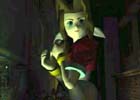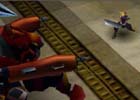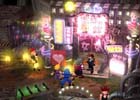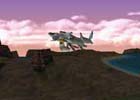Final Fantasy VII
| Also Known As: FFVII, FF7 | ||
| Genre: RPG | ||
| Platform: Playstation/PC | ||
| Allegiance: Square Inc./Eidos (PC Version Only) | ||
| Vintage: 1997 | ||
| Rating: T | ||
| Intelligence Agency Report by: Kuzu Ryu Sen | ||
| The world is dominated by one entity: Shinra, a massive corporation that rules from the metropolis Midgar. For some, Shinra is a liberator from darkness and antiquity. For others, Shinra is a brutal dictatorship with a rumoured hidden agenda that will destroy the world. However, for people like Cloud Strife, a 19-year-old youth from the mountain village of Nibelheim, Shinra is just something there to profit from. In Cloud’s case, he has joined the anti-Shinra group AVALANCHE as a mercenary. While his first mission goes off without a hitch, his second mission goes terribly wrong, and Cloud is separated from the rest of his squad. While trying to return to headquarters, Cloud meets a flower girl in a church… and sets off a sequence of events that will shake the very foundation of the world they live on. | ||
|
|
||
| Weapons Expert Report by: Kuzu Ryu Sen | ||
| Story/Premise Gameplay Impact Visual Audio |
7.00 6.50 8.00 8.50 8.50 |
|
| Overall | 7.75 | |
| (not an average) | ||
| Version Reviewed: PC
Final Fantasy VII is first in a lot of things. It was the first Final Fantasy VII for the PlayStation. It was the first Final Fantasy (and RPG for that matter) to gain widespread popularity in North America, and it was the first 3D Final Fantasy. It was also the first Final Fantasy to take on more science fiction themes as opposed to classic fantasy overtones of its predecessors. Finally, it is the Final Fantasy game with the largest fan following, and therefore is the game widely regarded as the best in the series. However, the final “first” is a mere fantasy of the legions, for Final Fantasy VII is far from the best that Square has ever produced. However, that is not to say that FFVII is entirely a bad game. It has many strengths, primarily centering around its audio/visual aspects. The graphics were revolutionary for the time, and the backgrounds definitely looked excellent. The character and enemy designs were also quite well done, and even though they lacked the flair of Amano Yoshitaka’s works, they were detailed and fairly creative. Uematsu Nobuo’s soundtrack lacks a little of the emotional punch that defined previous Final Fantasy games, and his skill is a little diluted between the 4 CDs of the OST. Even so, the music is excellent, with enough memorable tracks to embarrass all but the finest soundtracks out there. Aside from a few clipping issues that I’m not sure the producers could help, FFVII is definitely a treat for the senses. On the other hand, gameplay… is a mixed bag. FFVII is a very easy game to play, with a magic system that even an idiot could figure out after 5 minutes. There’s a wide range of spells, abilities, and summons for the player to use, and the Limit Break system was implemented correctly after its initial introduction in FFVI. However, the game is, quite simply, too easy. The materia system renders every character identical give or take 100 points of damage (which isn’t a lot when you get into the thousands), and gives no incentive for strategy. Likewise, any need for strategy is further stifled by the fact that each character has his/her own set of exclusive weapons, so all the player has to do is collect them and choose the strongest one. There is no contemplating the effects of a spear on the hit rate or the effects of a second sword vs. a shield, or anything like that. In the end, the gameplay becomes nothing more than attack spamming with the occasional powerful summon or limit break. Still, the worst parts of the game are the storytelling aspects. While the plot and characterization had a great deal of potential and excelled in the early game, the producers/writers made the mistake of trying to tell two stories at once. This had the effect of diluting the primary villain’s impact on the story, while turning Shinra, the original villain, into the FFVII equivalent of Team Rocket. In the end, the consequence of this is that the ending lacks the punch and motivation to evoke any emotion from the player, and the last quarter of the game was largely spent going through the motions in order to see the subpar ending. Most of the characters were just stereotypes, with no real depth past one side story. Heck, the majority of the characters gave me a “this is more than what we signed up for, but we can’t wuss out now” feeling by the end of the game. It’s kinda funny, because the character with the most depth… is the character with the least game time. In the end, Final Fantasy VII is a fairly fun albeit heavily overrated game. It’s simple enough for all people to enjoy, and is very strong graphically and aurally. Yet it’s not a game that will deliver any emotional impact, nor is it a game that can really be played multiple times in order to relive its story. Frankly, while revolutionary and groundbreaking, Final Fantasy VII is really nothing more than a little above average in terms of overall quality.
|
||




